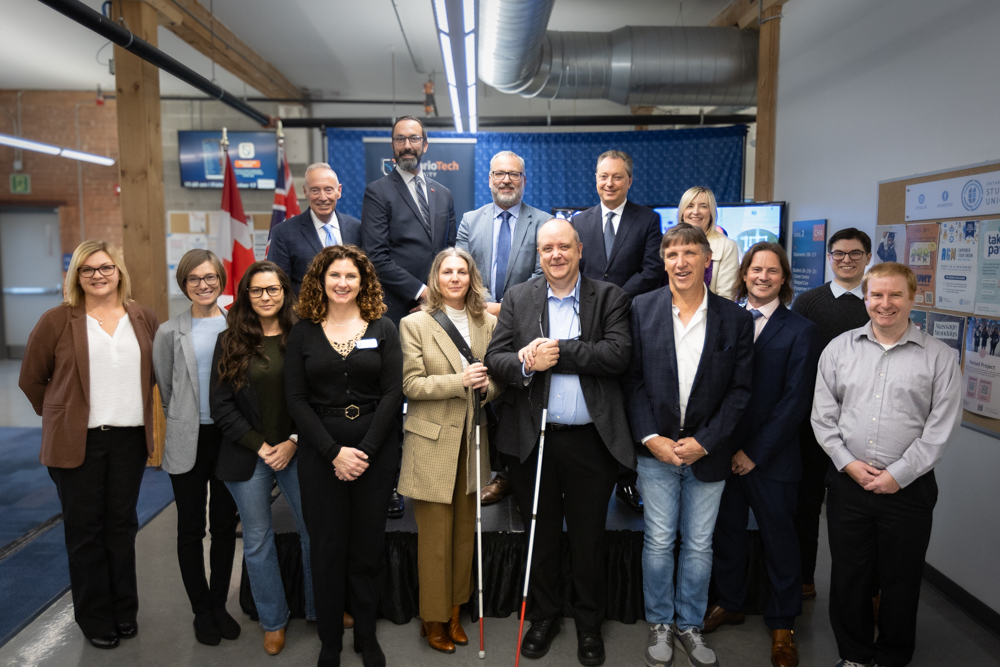IT security researcher receives rare international distinction
Dr. Xiaodong Lin named IEEE Fellow for his work in the field of secure and privacy-preserving vehicular communication
January 17, 2017

The world’s largest technical professional society has bestowed one of its most prestigious honours on a University of Ontario Institute of Technology (UOIT) researcher for his contributions to the field of security and privacy in vehicle-to-vehicle communication.
The Institute of Electrical and Electronics Engineers (IEEE) has awarded the IEEE Fellow distinction to Xiaodong Lin, PhD, Associate Professor, Faculty of Business and Information Technology (FBIT). Dr. Lin is the first faculty member to be named an IEEE Fellow while at the university. IEEE Fellow, the highest membership grade in the society, is conferred on individuals with extraordinary accomplishments in any of the IEEE fields of interest. Fewer than one-tenth of one per cent of the total number of IEEE voting members are elevated as fellows each year; receiving the honour is considered an important career achievement within the technical community.
Dr. Lin’s research interests include information security, privacy-enhancing technologies, digital forensics and applied cryptography (the science of concealing and deciphering computer data to keep it private). He is internationally recognized for his innovative work in the field of security and privacy in wireless communications and networking, most notably in vehicular ad hoc networks (VANETs): mobile wireless networks that enable on-road vehicles to communicate with each other.
VANETs show great promise in helping improve road safety and traffic management; they could, for example, enable vehicles to warn each other about accidents or traffic jams ahead, giving drivers a chance to change lanes quickly or choose an alternative route. However, as open networks, they are also vulnerable to various types of hackers who could steal a driver’s personal information, block the transmission of critical information or send out false information that could cause collisions or congestion.
Authentication technology is typically used to help secure wireless communication by verifying the legitimacy of the message and its sender. The challenge with VANETs is constantly changing traffic density and network layout; as the number of vehicles in the network increases, so does the number of messages sent and received. High message volume could inhibit a vehicle’s ability to verify the authenticity of incoming data in a timely manner, which means the driver might not get the information in time to respond appropriately.
Dr. Lin introduced the concept of conditional privacy for vehicular communications: quick and efficient safety-message authentication that protects the driver’s identity and location from the public, but still allows certain trusted authorities (e.g. police, Ministry of Transportation) to trace the real identities of message senders in the event of traffic disputes, such as a crime/car accident scene investigation. Conditional privacy has since become a key design objective for secure and privacy-preserving protocols for vehicular communication.
In addition, Dr. Lin pioneered the idea of integrating cryptographic and privacy-enhancing techniques with social theory—using social network analysis techniques to determine the most ‘social’ or frequently visited points on a given route, and then strategically placing special computing devices in those spots to help speed up message processing.
He was the co-recipient of eight Best Paper Awards at international conferences, including:
- 12th EAI International Conference on Security and Privacy in Communication Networks (SECURECOMM 2016)
- 18th International Conference on Computer Communications and Networks (ICCCN 2009)
- IEEE International Conference on Communications 2007
Dr. Lin serves as an associate editor for many international journals. He has served or currently serves as a guest editor for many special issues of IEEE, Elsevier and Springer journals and as a symposium chair or track chair for IEEE/Association for Computing Machinery conferences. He also served on many program committees. He currently serves as Chair of Communications and Information Security Technical Committee (CISTC)—IEEE Communications Society.
Quotes:
“This is a well-deserved recognition of the excellence of Dr. Lin’s scholarly contributions. With more than 100 refereed publications, he has received more than 11,000 citations, numerous best paper awards and other academic recognition. He is a terrific mentor to his students at the University of Ontario Institute of Technology, currently supervising four PhD and three Master of Science candidates, and always ensuring they are recognized as co-authors on research with him. He is generous in providing mentorship and support to junior faculty members as well.”
- Pamela Ritchie, PhD, Professor and Dean, FBIT.
“I am deeply honoured to have received this important recognition from the IEEE. I am very happy that my work in the area of security and privacy in vehicular ad-hoc networks has been recognized internationally and honoured in this way. I am also very grateful for all the support and encouragement the faculty and the university have given me. This recognition would be impossible without the excellent platform provided by the Faculty of Business and Information Technology and the University of Ontario Institute of Technology."
- Xiaodong Lin, PhD, Associate Professor, FBIT.



